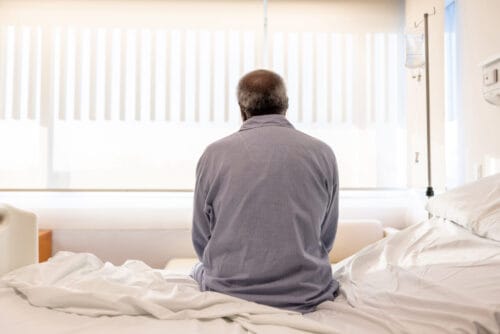Elijah Nouvelage, Getty Images
New research from Boston Medical Center indicates that reproductive healthcare providers must acknowledge racism to break down some of the mistrust.
On June 24, 2022, the U.S. Supreme Court overturned the landmark legislation Roe v. Wade, which allowed the constitutional right to abortion. As of this writing, 13 states have enacted total abortion bans and one, Georgia, has a six-week ban — which is before most people know they are pregnant. The court’s ruling sparked fear, outrage, and activism. Much of the outcry centered around access, especially for poor Black women and birthing people, who already face racial barriers to gynecological care and reproductive services, and according to the Pew Research Center, Black women made up the highest percentage of individuals who sought an abortion in 2020 at 39%.
In order to better understand the challenges that Black women and birthing people face in the wake of abortion bans and Roe’s overturning, HealthCity spoke with Kelly Treder, MD, MPH, an obstetrics and gynecological physician at Boston Medical Center (BMC) and the lead author of a recent paper, “Racism and the Reproductive Health Experiences of U.S.-Born Black Women,” which digs into the ways racism intersects with Black women’s lived experiences in accessing reproductive care.
HealthCity: One of your research findings was that Black birthing people preemptively go into medical appointments with “self-protective strategies.” What do you mean by that in practice? How do you both hold space for that and also provide care?
Kelly Treder, MD, MPH: We went into this project trying to understand how Black birthing people were experiencing racism in reproductive healthcare, and these self-protective strategies are something that emerged from those conversations — we uncovered about 12 different strategies, but I am sure there are more. Some people were especially conscious about these strategies, and other people just talked about how they interact with the healthcare system, they weren’t necessarily aware that they were doing something to protect themselves.
And now, after the Dobbs decision, in many states we have a healthcare system where reproductive healthcare providers are not capable of offering pregnant patients comprehensive healthcare and discussing all of their options. Black and brown women have had their autonomy restricted for centuries, especially within reproductive healthcare, and this is not going to make the relationship with the healthcare system better. I worry about the damage that it will do to the already very fractured patient-physician relationship between people of color and the healthcare system.
HC: What does the Supreme Court’s decision to reverse Roe v. Wade mean for your patients?
KT: Our study participants were very aware of the brutal history of reproductive injustice in this country and that influenced them. I remember one participant wondering if birth control was the right choice for her, given the history of Black women being forced and coerced into sterilization and other birth control methods. We had a conversation about how that history provides a context for her current reproductive healthcare and affects the decisions she makes.
We also saw the power of the vicarious experience. People really, really felt the experiences of their friends, their mothers or their sisters, or just their community as a whole. They see a community in a reproductive healthcare crisis, and they are feeling that during their individual encounter with their provider. Acknowledging and respecting that was really powerful.
We are in a privileged position here in Massachusetts where our state is relatively more protective of abortion rights and access, and that is a gift. Still, expectations are that the fall of Roe v. Wade overall is only going to worsen all of the inequities that we see in reproductive health, that Black and brown birthing people face. Even with abortion funds going toward restrictive states for travel costs, Black and brown patients are less likely to have economic supports in place to be able to leave their state and their existing children to travel and get an abortion. One effect that we anticipate is that maternal morbidity and mortality will increase in all groups, because so many people simply will not be able to access abortion. And not surprisingly Black birthing people are expected to experience the most dramatic increases in pregnancy-related morbidity and mortality. In terms of the crisis in Black maternal health, this is a huge step in the wrong direction.
HC: Abortion has long been a hot-button political issue. Can you shed some light on abortion as a medical procedure?
KT: Abortion is the only part of healthcare that is regulated like this, by the state and by the federal government. It’s unique in how it’s evolved to be such a political fixture in our society. Healthcare as an industry is, of course, politicized. We can talk about the issues with insurance access and Medicaid expansion and all of the issues tied to that — but that’s different than access to a medical procedure. It’s incredibly unique to have a medical procedure so highly politicized and regulated, especially a medical procedure that is known to be so safe. And abortion is actually quite common. So many people have either had an abortion themselves or know someone who has. The most recent Supreme Court ruling is devastating. My only hope is that this latest attempt to restrict abortion access will motivate patients and providers to come out of silence, confront the stigma that abortion carries, and combat the way that abortion care has been so unnecessarily and unfairly thrust into the political arena.
HC: How do we meet patients where they are while simultaneously working for a future with better access to care and fewer barriers for patients of color?
KT: There can be a lot of value in acknowledging the history and experience that many Black and brown patients are bringing to a reproductive healthcare experience and creating a space for that.
There was a huge number of participants in our research study that talked about their fear of dying in childbirth and pregnancy — not necessarily because they knew someone who had, but because public knowledge regarding Black maternal mortality has increased.
“As reproductive healthcare providers, we have this huge role in dismantling oppression, into rehumanizing people because we’re taking care of this really core, central part of people’s humanity and identity.”
One participant, I will never forget, said, “Do I have to make a will in the nine months of my pregnancy?” We need to create a space for people to express those fears. We also need to develop strategies to protect patients from the racism and other forms of oppression they are experiencing in healthcare. There is a lot of work to be done.
Our participants really wanted more providers of color. We’re unfortunately probably decades away from seeing equity in the wider provider workforce nationally, but how can racially discordant providers still create a space for patients of color to feel safe discussing their fears about racism in care? It will require more people who have direct patient access to be vulnerable and say, “I want to acknowledge the difference that is here between us, and there are times where I’m going to be wrong and I want you to know it’s a safe space for you to say that I’m wrong.”
There’s this Dorothy Roberts quote that summarizes what we’ve been talking about she says, “The thing about reproduction is that more than anything else, it tells you how a society values people.”
As reproductive healthcare providers, we have this huge role in dismantling oppression, into rehumanizing people because we’re taking care of this really core, central part of people’s humanity and identity.
This interview has been edited and condensed for length and clarity.


